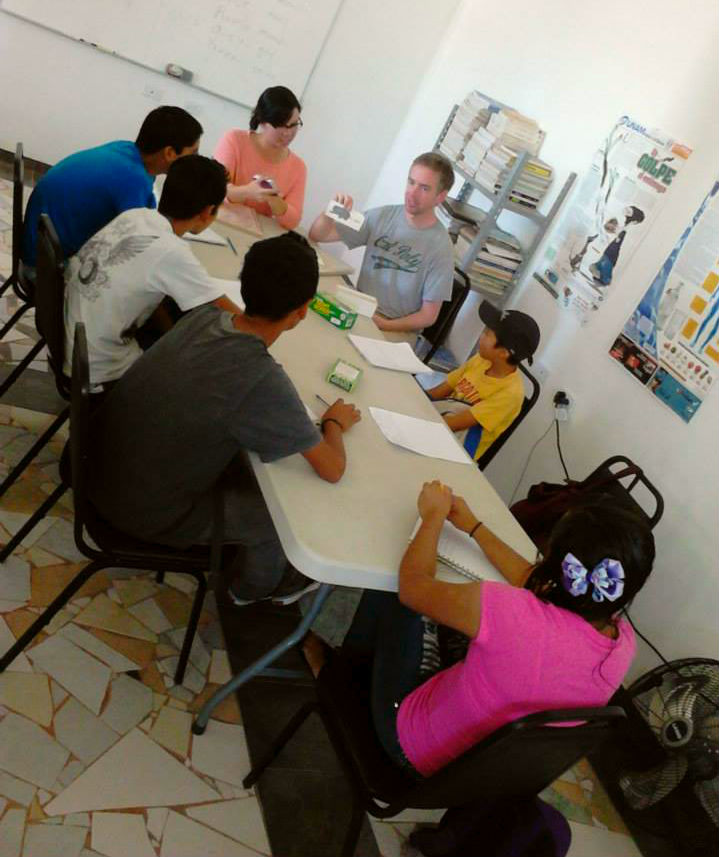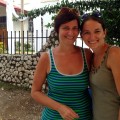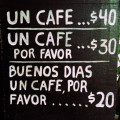08Aug14
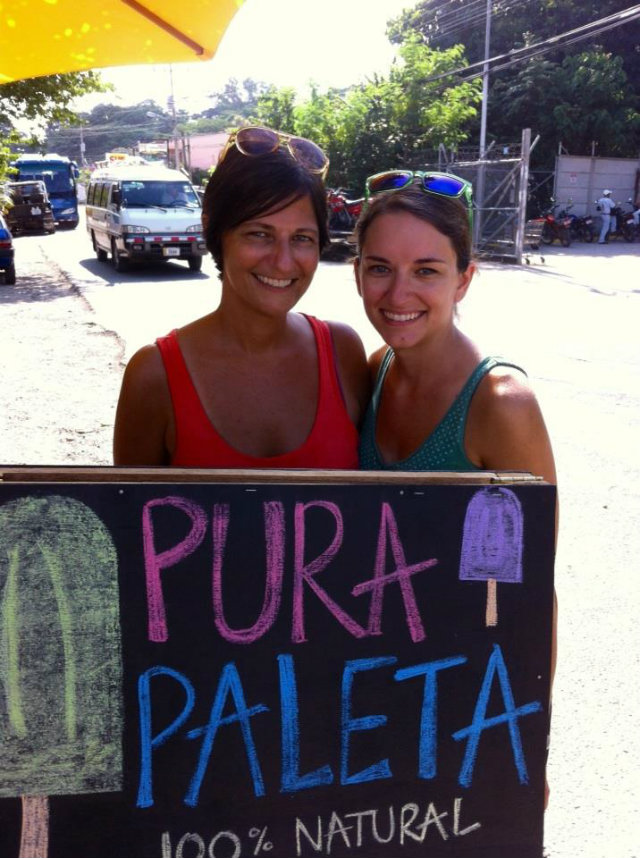
Remember when we introduced you to Brookie (right) and Lisa (left) from Sámara, Costa Rica? We liked them immediately, and not just because they sell the tastiest treats on the streets. These two are our age and started a new life and business in Costa Rica, so I interviewed them a while back (better late than never!) to learn how they did it. Two minutes in, Lisa tells me:
“When Brookie and I first met, I told her, ‘Don’t fall in love with me — I’m moving to Costa Rica.’ That was our first date.”
And that, friends, is how I knew their story would be a good one to share. We don’t do it often on this blog, but it just felt right. Not just because they’re an interesting and inspirational duo, but also because they’re a couple of regular Janes building a life and business they want, despite barriers that hold other people back.
Tamara: Let’s go back in time. Who were you before moving to Costa Rica?
Lisa: We lived in Atlanta’s Cabbage Town neighborhood. It had the best restaurants, but also crackheads. I worked at a preschool and Brookie was a teacher. We were everyday people with granite countertops and stainless steel appliances. We worked all day, came home and watched TV mindlessly, then started the process over again the next day.
Brookie: My first five years teaching were in a small suburb outside Atlanta. I wanted to serve the community I lived in, so I moved to an inner-city school. It was incredibly stressful. Imagine a huge classroom full of children with behavioral problems. I was working crazy hours. We both realized that we were losing our way toward happiness. We weren’t finding the path. We’d talked about moving to Costa Rica before because Lisa loved it so much.
T: Lisa, at that time you’d already moved to Costa Rica once and came back, right? How did that come about?
L: My childhood best friend moved to Costa Rica a decade prior and I visited every year. One day, she called and said, “I’m pregnant! Want to take over my job at this Spanish-language school?” I had just accepted a promotion at my corporate job for a beer, wine, and liquor distributor. I was happy, but I’d also fallen in love with Costa Rica and was seriously considering her offer. The VP of my company said to me, “Costa Rica is your dream; you’re going to shoot yourself if you stay here.” I took the job.
T: That’s a boss who keeps it real. What happened next?
L: Brookie and I met, and I told her, “Don’t fall in love with me — I’m moving to Costa Rica.” That was our first date. My stuff was in storage and I was leaving in three months. But the job in Costa Rica didn’t last long because there weren’t any tourists due to the recession. So I came back.
T: How did you two decide to take the leap and move to Costa Rica together?
L: Brookie came to visit me twice in Costa Rica; that’s what really helped plant the seeds. On one trip, we were waiting for the bus from Sámara to Carrillo, where we live now. I remember we looked at each other and were like, “Could we do this? Could we make this work?” A few months later, we saw a Craigslist job posting at a school in Sámara. That’s when we decided to make it happen. Things just started falling into place.
T: What was it like just before you set out? How were you feeling?
B: I still remember how I felt when I told my principal I wasn’t returning next year. It was so liberating. And I remember selling my car. As it was driving away, it really hit me: wow, we’re moving to another country. Our last day in the house we spent cleaning, then we ordered food and were just sitting there on the wood floors filled with excitement.
T: When you first got to Costa Rica, how did you each make a living?
B: I started as a teacher at the private bilingual elementary school we saw the Craigslist ad for. My background in teaching was a huge benefit for us starting out, and something I’m insanely passionate about. I’m an introvert, so being a teacher helped me integrate myself in the community. People would say, “Oh, she’s the one teaching those English classes!” That opened up a lot of doors. People know we’re trying to make a life here; we’re not just two gringas passing through.
L: Brookie won’t say this, so I will: she’s one of the best teachers I’ve ever seen. Children light up and their parents see it. Other schools were trying to recruit her. After teaching at the elementary school, she started teaching adults English. Now that we have our own business, it’s really helped us that people know who she is. I was doing property management at first, but it was so stressful that I quit and we relied on Brookie’s teaching background. I worked in a restaurant for a while, but that wasn’t going to support us so we started brainstorming business ideas.
T: How did you decide what kind of business you wanted to start?
B: It’s very common here for expats to go the restaurant route. We both are major foodies: we love eating good food, creating good food. We were interested in the restaurant idea, but it’s a really huge investment. Food trucks too. Also, you have to find the balance so paradise is still paradise. Those ideas could make us a lot of money, but we’d lose the lifestyle we moved here for.
T: What inspired your business, Pura Paleta?
B: It all started when I wanted some good ice cream! I was sick and tired of not having good ice cream in this town. Lisa was in the States and a friend randomly had an ice cream maker; she gave it to us and Lisa brought it back. We were really excited, thinking, “This is what Sámara doesn’t have that people will definitely want!” The up-front investment was a lot lower, but then we ran into problems.
T: What kind of problems?
L: Getting good-quality cream. Then, we were researching ice cream recipes and we came across the ice pop, or paleta. We remembered this guy in our neighborhood in Atlanta, an attorney, who fell in love with paletas when he was in Latin America. He started an ice-pop stand called The King of Pops. It was the perfect concept for us. Fruit is plentiful in this country and it’s always hot outside. The possible flavor combinations were endless. And we didn’t have to invest that much to get started.
T: What was it like when you first started selling paletas?
B: There aren’t a lot of gringos selling food products on the side of the road like Ticos do. Taxi drivers were staring at us, and one came over and asked, “What are you doing?” They were so confused, but wouldn’t bat an eye if it were a Tico doing it. Gringos sell stuff in stores or farmer’s markets. We were sitting on the side of the road and interfacing with people. That created some buzz for us. If we need to change how we’re doing it, we will. But so far it works great. Facebook is also helpful for us for spreading the word.
T: How’s business so far?
L: Sales have been great! People have embraced us and want us to be successful. Even though everybody is from different places, there’s something that ties us together. I hope that we’re providing an experience that’s more than just a paleta; it’s an experience of what Sámara is like.
B: If this continues to take off, we could get equipment that will freeze ice pops in just 15 minutes. The day we put in the order for that machine, we’ll have made it!
T: What’s it like, this new life you’ve built for yourselves? Both the good and the bad.
B: People are so much happier here with less. You’re more grateful, for the beach around you, sitting and having a beer, awesome conversation. I look at my watch and I’m like, “Whew, I’d just be getting off work.” I know I’m happier now than I was in the States. There are not a lot of 25- to 45-year-olds who’ve consciously decided to not just travel but to make this a permanent home, so friendships and relationships are difficult. When I’m at my happiest, I’ve had a great day selling pops. Remembering to embrace the simple life is sometimes hard though. I have to remember not to get upset with this life because today wasn’t the best day.
L: Over the last three years, we’ve trained our brains to think in a different way. I used to love gadgets. Like, the new iPhone is coming out! We are more conscious of needs versus wants now. When we go back to the States, our friends forget that our priorities have changed — it doesn’t really register for them. Everybody there oozes stress. We feel lighter, healthier. This life isn’t for everybody though. I do feel blessed that I have my childhood friend an hour away. If I’m having a major breakdown, I can go to her.
T: So what’s on the horizon for you both?
B: There are definitely more places we want to travel to. It’s difficult because we have animals and I’m very dedicated to them. To me, it’s important we stay situated somewhere, at least through our dog Bella’s life. We have a cat, Addi, too. I told Lisa, in the last year, this has definitely become home. That shift has happened. I used to say, “I want to visit home,” but now I say, “We should go to the States.” This feels more like the life that I want. I’m teaching right now to supplement us — the pay isn’t great, but it’s very rewarding. We’d love it if Pura Paletas took off. It’s my dream to have some land here with fruit trees and animals running around.
L: Brookie wants a goat! Costa Rica is definitely ripe for this moment for us. We’re not trying to make millions; we want enough to live comfortably. We just started the business this past May. It’s all about poco a poco. We’re not ready to retire, and hopefully that will open the door for our next Central American adventure.
Photos courtesy of Brookie and Lisa and the Pura Paleta Facebook page. Thanks and buena suerte, ladies! We’ll see you again soon, I’m sure.
